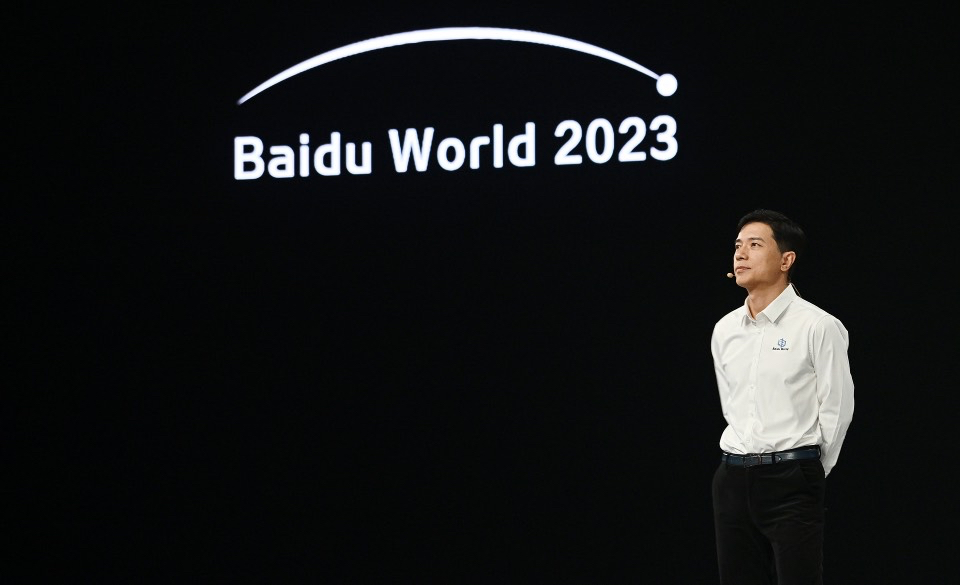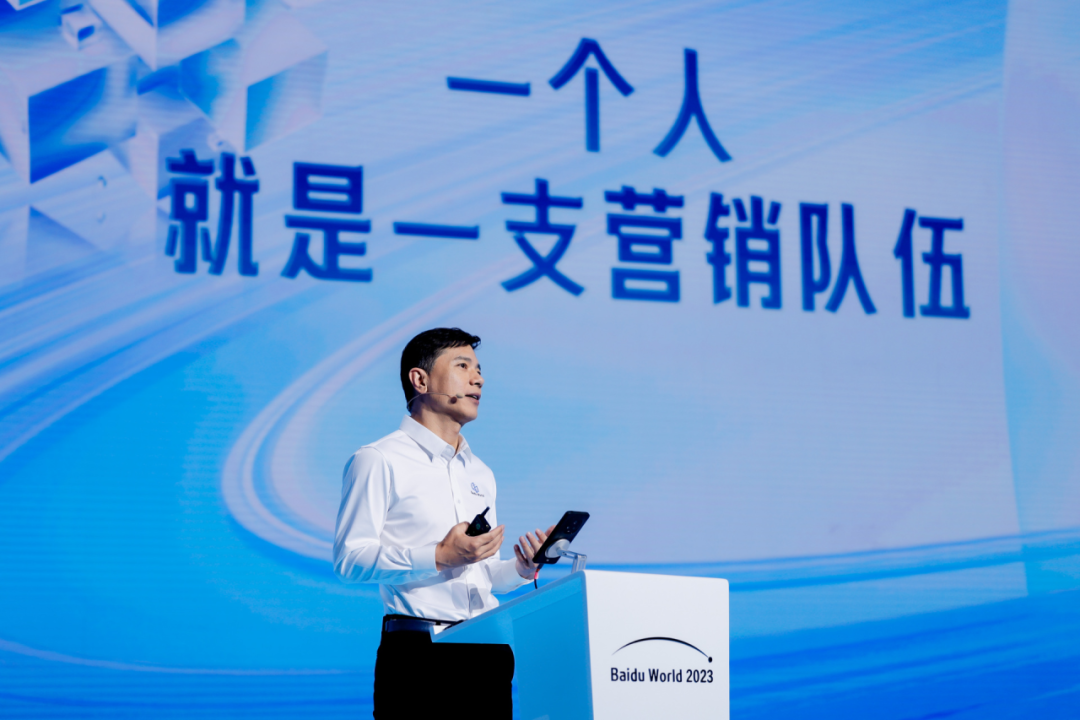Source: Brain Pole

Image source: Generated by Wujie AI
So far this year, many people may have felt that AI large models are incredibly popular. No matter which industry you are in, you can feel the rapid progress of technology. Not wanting to fall behind the times, there will inevitably be curiosity and longing for native AI applications. However, once you start practicing, you will find that AI applications are different from traditional software, and prompt learning ability has requirements, making it too difficult to get started. Therefore, most people think a lot but do little.
At this time, the industry may need someone to tell everyone how to write prompts? How can ordinary people embrace the native AI era?
At this juncture, Robin Li and Baidu have once again stepped forward.

At Baidu World 2023 held on October 17th, not only did it bring 11 new native AI applications, but Robin Li also personally taught you how to make native AI applications.
Robin Li said, "We are about to enter a native AI era, entering an era where humans and machines communicate with each other through prompts, and the future will be generated by you."
In the prompts written by Robin Li, I read a kind of poetic sentiment of Tao Yuanming.
When it comes to Tao Yuanming, many people think of the carefree and elegant "Picking chrysanthemums by the eastern fence, leisurely seeing the southern mountains," but they do not understand his realistic spirit of "worrying about diligence and self-responsibility." In the agricultural era, "urging farming" was a major national event. The poet Tao Yuanming, who did not hold an official position, did not have the responsibility to urge farming, but out of a sense of social responsibility, he would consciously write the poem "Urging Farming" to tell people the importance of farming, and he would also practice it himself, plowing the fields because "the grass is lush and the bean seedlings are sparse."
In an era when scholars considered plowing as "shameful," Tao Yuanming still insisted on "getting up early to clean up the wilderness, carrying a hoe under the moon," which was indeed rare. Looking at today's technology industry, the founders who closely follow the forefront of technology and worry about diligence and self-responsibility are also rare. Robin Li is one of them.
At Baidu World 2023, Robin Li became the "urging farming" person for AI, personally writing down prompts and teaching you how to make native AI applications, opening the prelude to the native AI era.
The poetic meaning of Baidu's connection with AI and the fertile soil of intelligent China may be found in the words of Tao Yuanming.
The seeds of native AI applications sprouted at Baidu World 2023
After a booming "AI summer," the number of large models has become quite substantial, but new challenges have also emerged: the public's expectations and demands for AI large models have been raised very high. However, in the face of so many large models, there is a lack of understanding and pathways on how to integrate large models with business scenarios, as well as a lack of application skills, which has hindered the further popularization of large models.
If the basic model is the soil, then to reap the benefits of new technology, continuous cultivation and watering are needed to allow native AI applications to "emerge from the soil."
So in May of this year, Baidu became the first batch of large model manufacturers to start cultivating native AI applications. At that time, Robin Li proposed that Baidu should use AI thinking to restructure all products and create native AI applications.
Several months later, at Baidu World 2023, Robin Li also brought a series of explorations by Baidu.
First, the basic capabilities of native AI applications were clearly defined. In Robin Li's view, native AI applications are applications developed based on the understanding, generation, logic, and memory capabilities of large models, which were not possessed in the past era, thus opening up infinite innovation space.
Second, Baidu's internal application exploration was truly demonstrated. Baidu's rich product system provides ample business scenarios for the reconstruction of large models and the exploration of native AI applications, which was also publicly displayed this time to stimulate the public's imagination of the application of large models. For example, the newly reconstructed search no longer provides a bunch of links when entering a question in the search box, but uses large models to understand and generate the best answer, greatly improving search efficiency.
In addition, Baidu Wenku, Baidu Netdisk, Baidu Maps, and Baidu Apollo intelligent cockpit, among other Baidu applications, have all been "reconstructed" to provide users with new experiences and value.
Finally, continuously assisting in the industrial transformation of large models.
Of course, if the value of large models is only used internally by Baidu, it will not be effective for various industries that want to embrace AI. Therefore, at Baidu World 2023, we also saw Baidu promoting the industrial transformation of large models through new products and platforms.

Robin Li mentioned that in business competition, it is not the big fish eating the small fish, but the fast fish eating the slow fish. If you make decisions faster than your competitors, you are likely to win! The first domestically generated commercial intelligence product introduced at Baidu World 2023—Baidu GBI—fully unleashes the value potential of basic models, shortening the data analysis and report writing work that business analysts take several days to complete to minutes.
Baidu Intelligent Cloud also launched the AI native application development platform today, which can summarize common patterns, tools, and processes for developing various applications based on large models and consolidate them into a platform, allowing each developer to focus on their business demands without worrying about the development process. At the same time, the first domestic one-stop trading AI native application store for enterprise customers—Qianfan AI Native Application Store—was launched to help developers promote AI native applications to target customers and achieve commercialization and monetization.
From the months of "cultivation" by Robin Li and Baidu, we can see that native AI applications are gradually sprouting on top of basic models. Behind the thriving native AI applications, what is more important is a technical fertile soil that can nurture more application seeds and a prosperous ecosystem. There, lies the poetic and powerful force of Chinese AI.
Fertile soil for culture, the co-cultivation of Robin Li and Baidu
Tao Yuanming did not regard plowing as a hardship, but rather as a pleasure, giving him a solid sense of life. He once wrote such a poem: "The heart is far away, but it is related to the past. I hope it will always be like this, and plowing is not to be lamented."
This poem is quite fitting to describe Robin Li and Baidu, who are "urging farming" for AI.
I believe that most people agree that the fourth industrial revolution and new infrastructure driven by AI as the core will promote new high-quality economic growth in China. Robin Li and Baidu have long placed this national event close to their hearts and actions, working diligently bit by bit.
AI, as a technology, is ultimately driven by people. To understand the internet era, one must understand Bill Gates and Andy Grove; to understand the mobile internet era, one must understand Steve Jobs. So in the AI era, Robin Li is an indispensable leader.
For over a decade, he has been the most steadfast investor in AI in China.
In early 2010, in an era when many people did not know what AI was, Baidu was the first to establish the "Natural Language Processing Department," initiating the exploration of AI technology. In 2013, Baidu announced the establishment of the Institute of Deep Learning (IDL), with Robin Li serving as the dean, and has been persistently investing in it. It was because Baidu started laying out at that time that the Chinese industry did not miss the rise of deep learning.
For many years, regardless of the ups and downs of AI development, Robin Li has persisted in researching and investing in AI, with Baidu's R&D intensity reaching nearly 20%, ranking first in China.
It is precisely because of Robin Li's long-term investment in AI that Baidu has cultivated a group of internal AI talents such as Wang Haifeng, Wu Tian, and Wu Hua, making Baidu a highland of AI talent in China.
Therefore, when the era of large models arrived, Baidu was already prepared with a foundation. In 2019, Baidu began deepening the development of pre-trained models, released the Wenxin large model 1.0, and established a series of tools, platforms, and methods to support the application of large models. At the same time, Robin Li, who has a dual identity as a technologist and entrepreneur, also keenly observed the technological trends of large models. On multiple occasions, he proposed that "the real opportunity brought by large models is in applications," and that "rolling out large models is meaningless, rolling out applications is where the real value lies," and he pushed Baidu to become the first technology company to restructure products using AI.
Today, these judgments have been validated. It is these forward-looking strategic deployments that have allowed Baidu to be ahead in both the "model" and "application" fields.
In 2023, while many companies were still trying to develop a single AI large model, Baidu not only upgraded the Wenxin large model to 4.0, but also directly reconstructed dozens of native AI applications, defining and demonstrating the conditions, forms, and interaction modes of native AI applications. They were two steps ahead of the industry's pace, establishing Baidu's first-mover advantage in the native AI era and seizing the initiative.
In September 2023, Time magazine released the first Global AI Leaders list, which included Baidu's founder, chairman, and CEO Robin Li, Tesla CEO Elon Musk, NVIDIA founder and CEO Jensen Huang, and OpenAI CEO Sam Altman. Time's evaluation was: "Robin Li is China's most outstanding futurist, dedicated to the wave of AI development for a long time."
For those who do not understand AI, Robin Li and Baidu's outstanding performance in the era of large models may seem like an unexpected "unsolved mystery." However, Baidu's AI cultivation for over a decade actually embodies the wisdom of China's agricultural civilization tradition: enduring through the seasons, harvesting in autumn and storing in winter. The harvest often comes from sowing the seeds in advance.
From this moment, the flourishing of China's AI ecosystem Robin Li's reconstruction of native AI applications and Baidu's decade-long sowing and harvesting have allowed Baidu to seize the initiative in the AI era.
In dreams, I search for him countless times, and suddenly look back, China's AI has already deep and fertile soil, and the young seedlings are thriving. Standing on Baidu's technological foundation and support system not only ignites Baidu's development momentum for the next stage, but also has a close relationship with the impending industrial intelligence revolution in China.
Robin Li, who has been cultivating AI, has the purpose of teaching you how to make native AI applications hand in hand, because he sees that the Chinese AI native application ecosystem needs more down-to-earth sowers and cultivators. Therefore, he has opened up Baidu's seeds, soil, and tools at Baidu World 2023.
Looking at today's Chinese AI, we will find several important foundations already in place:
Solid foundation. The seeds of native AI applications need to sprout in fertile soil, and the Wenxin large model provides such a technological soil. The progress of Wenxin 4.0 in understanding, generation, logic, and memory, is the foundation on which all native AI applications rely. Enterprises can apply for API access through the Qianfan platform. It can be seen that the Wenxin large model can be part of the "infrastructure" of artificial intelligence, supporting a wider range of industrial applications.
Application demonstration. The AI native applications demonstrated by Robin Li come from Baidu's diverse businesses, have withstood tremendous traffic tests, and have proven the usability and reliability of large models. This provides specific and tangible capabilities and value for various industries to understand and apply large models, becoming a driving force for the further industrialization of large models.
Complete tools. Enterprises and individual developers need targeted platforms and tools for large models to reduce the technical acquisition threshold and improve industrial development efficiency. We can see that the Wenxin large model has long launched development kits, APIs, and the Qianfan platform, with the most comprehensive and comprehensive toolchain. Currently, 17,000 companies have developed industrial models and solutions based on the Qianfan platform, covering nearly 500 scenarios in various industries.
Baidu is turning large models into an intelligent foundation for thousands of industries, and is handing over the seeds of native AI applications to every individual and every enterprise, allowing them to take control of the technology and become the protagonists of the native AI era.
Robin Li emphasized that China has rich application scenarios, and Chinese users are naturally willing to embrace new technologies. With advanced basic large models, we can build a thriving native AI application ecosystem and jointly create a new round of economic growth.
The flourishing of China's AI ecosystem is nurtured in the seeds of native AI applications. The time of abundant harvest is the time when Robin Li and Baidu have been cultivating.
"Commercial songs are not my business, but they are in the co-cultivation," which is the poetic essence of Chinese AI.
免责声明:本文章仅代表作者个人观点,不代表本平台的立场和观点。本文章仅供信息分享,不构成对任何人的任何投资建议。用户与作者之间的任何争议,与本平台无关。如网页中刊载的文章或图片涉及侵权,请提供相关的权利证明和身份证明发送邮件到support@aicoin.com,本平台相关工作人员将会进行核查。



